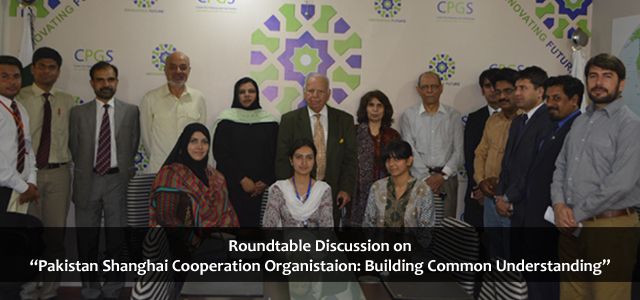 Islamabad: The Centre for Pakistan and Gulf Studies (CPGS) organized a roundtable discussion on “Pakistan and Shanghai Cooperation Organization (SCO): Building Common Understanding” in collaboration with Konrad Adenauer Stiftung (KAS) at the CPGS office.
Islamabad: The Centre for Pakistan and Gulf Studies (CPGS) organized a roundtable discussion on “Pakistan and Shanghai Cooperation Organization (SCO): Building Common Understanding” in collaboration with Konrad Adenauer Stiftung (KAS) at the CPGS office.
The discussion was chaired by Lt. Gen (R) Syed M Owais, HI(M), Executive member Advisory Board; and the keynote speakers were Senator (R) M. Akram Zaki, Former Secretary General & Minister of State for Foreign Affairs, and Dr Mavara Inayat, Assistant Professor at School of Politics and International Relations, Quaid-e-Azam University. The event was widely attended by prominent policy makers, members of academia, government officials, practitioners, journalists, university students and the CPGS team.
The speakers highlighted the importance of Pakistan’s prospective membership of the SCO, particularly in the context of the evolving geopolitical and geo-economic realities of the region. The comprehensive and insightful presentations dilated upon the history of relations and present economic and strategic relations amongst the countries of the block.
The President CPGS, Senator Sehar Kamran (TI) in her welcome remarks, highlighted that the SCO countries plan to develop a ‘trade hub’ with partner states including Pakistan alongside its neighbors. She said that joining SCO was a wonderful opportunity for Pakistan, one that should not only be availed as soon as possible, but should be reciprocated by pursuing the case for China’s entry into SAARC.
Senator Kamran emphasized that in an interregional alignment, Pakistan should act as a conduit between the SCO countries and its neighbors for two reasons primarily. Firstly, its role in combating terrorism is vital for the region. Secondly, it provides the shortest possible trade routes to Central Asia, Iran and Gulf states on the one hand, and the Russian and Chinese markets on the other. Furthermore, she stressed that the expansion of the SCO could play a positive role in facilitating resolution of outstanding issues in Asia like Afghanistan and Kashmir. She also showed her concern that for the Gwadar Port to become fully functional, the security situation in FATA, Baluchistan and the neighboring Afghanistan would have to be addressed.
Ambassador(R) Akram Zaki in his presentation highlighted that “Pakistan and SCO, have common interest in combating “Terrorism, Separatism, Extremism Drug trade, and organized crime” which threaten their stability and hamper their development. The links between Pakistan and SCO are already well established, and Pakistan being an observer state, gets several opportunities during SCO meetings to develop common understanding with them. These opportunities will further increase when Pakistan is formally admitted into the SCO. Furthermore in the context of the recent developments with China, Ambassador Zaki, was of the view, that joining the SCO would provide further opportunity to strengthen Pakistan’s relations with its friendly neighbors, as well as provide a platform to lessen mistrust with the less-friendly ones.
Dr Mavara Inayat, in her remarks highlighted the importance of preparing for Pakistan’s entry into the SCO, keeping in mind the Phillip Taylor Model; which emphasizes on the nature of the relationships between members, the structure and functions of the organization and the processes involved. She also said that the SCO offers Pakistan a chance to ameliorate and strengthen its relationship with SCO member states in light of the changing geopolitical realities.
The speakers and expert panel thoroughly discussed the subject and collectively recommended that while some may hold reservations as to the utility of joining the SCO, Pakistan should make all efforts to join the organization. It should be wary of trying to force the pace of regional developments and should keep the expectations in check vis a vis the benefits that may be obtained. Joining a multilateral regional organization will not compromise Pakistan’s bilateral relationships.
While discussing the prospective membership, focus should be laid on the positive advancements that joining the SCO will enable the country to achieve at the national, regional and international platforms. The group also identified that Pakistan needs to work on two aspects in particular. First, the need for the development of a local ‘domestic’ eastern framework as a reference point that it can relate to, and second, understanding the nature of how the infrastructure created by Pak-China Economic Corridor would function to make it an effective gateway for Central Asian States (CARs).


